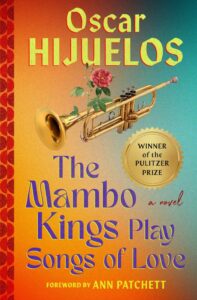Ann Patchett on Oscar Hijuelos’ Lush, Elegiac Novel Full of Music and Sex
"Bless the novels that provide accounts of the world that came before."
The Mambo Kings Play Songs of Love was first published in the late summer of 1989, when I was twenty-five. In those pre-internet days, my best friend Lucy was living in Scotland, and we read the novel together, writing letters back and forth about Cesar and his brother Nester as if they were people we knew. We wrote about the fluid music of Oscar Hijuelos’s prose, as well as the actual music to which the novel had introduced us. We were obsessed with the idea that life had a pinnacle, a perfect moment to which, in the unknowable future, we would one day hearken back.
For the Mambo Kings, as the brothers were known, the pinnacle came when Desi Arnaz invited them onto I Love Lucy for a cameo. They would pretend to be Ricky Ricardo’s cousins visiting from Cuba. They wore white silk suits and sang their plaintive hit, “The Beautiful Maria of My Soul.” Surely this was the first stop on what would be their meteoric rise, but as it turned out that silvery moment was as high as they ever went, their fleeting minutes in history forever immortalized in reruns.
The high point of life for Cesar and Nestor was different from the high point of the band, and different one from the another. For Nestor, his best days were clear: the time he spent in Cuba as the lover of Maria, the passionate and beautiful woman who was fully with him and then, just as fully, gone. Every day that followed her abrupt departure was another torturous reminder of all he had lost. Even the twenty-two versions he wrote of the song “The Beautiful Maria of My Soul” couldn’t overcome his melancholy. He met and married Delores, had two beloved children, and still he was moody, remote. In Maria, Nestor had found all he ever wanted, and when she was gone, the only thing he wanted was the past. Cesar, the older brother, balanced light to Nestor’s darkness. His devouring passion for life made no room to lament the abandonment of his country, his parents, his wife, daughter, or any number of women, as if the key to his joy was never looking back.
The past is the refrain to the Mambo Kings’ song of love, the continual loop on which the story spins. Nestor looks back to Maria, then Cesar looks back to Nestor. One imagines that even Desi Arnaz, who makes a reappearance at the end as a kindly old man, longs for his earlier days. The novel tells us there were always happier times that had not been fully appreciated despite the continual seizing of life, and those happier days fill the book with longing: for Cuba before Castro, for New York when mambo clubs ruled, for the women and men tricked out in all their finery as they took their place on the dance floor.
Reading The Mambo Kings Play Songs of Love again more than three decades later has pushed the worlds for which the Castillo brothers longed that much farther away, and added on layers that they would never have imagined. Not only are the mambo clubs gone, but so is this kind of lush, elegiac novel that wanders freely without a care for time. Reading it now, I’m struck by the disappearance of sex in literary fiction these days, as sex was the constant obsession of the Mambo Kings, their recreational pastime and soulful pursuit. How had I so clearly remembered all their music and forgotten all their sex?
Oscar Hijuelos was decades younger than Bellow and Updike and Roth, but he belonged to their age, and this novel belongs to that vanished era: the time when fictional characters and actual human beings rolled into bed together constantly, cheerfully, and without regret. Had this novel been written today it would surely present questions—Were the women fairly represented? Was there always consent?—but coming back as it is, The Mambo Kings Play Songs of Love should be taken as yet another layer of the past. We are always looking back, and we will forever judge what came before through the lens of our newfound wisdom. The Castillo brothers are looking back, and we are looking back at them, as decades from now others will be looking back at us. Bless the novels that provide accounts of the world that came before.
Not only are the mambo clubs gone, but so is this kind of lush, elegiac novel that wanders freely without a care for time.Oscar Hijuelos died of a heart attack at sixty-two. He was playing tennis. My friend Lucy died at thirty-nine. Of the many reasons I love this book, one is that Lucy and I had loved it together. The friendship of a couple of twenty-five-year-olds, who wondered if maybe we had already passed the best moment of our lives without knowing it, is now layered onto these pages. But this is a novel able to bear no end of wistfulness and loss, perhaps for the very reason that it is lying on a bed of sex and music, the appetites of unbridled joy, the very vibrancy of life eternal.
__________________________________

Excerpted from the book The Mambo Kings Play Songs of Love: A Novel by Oscar Hijuelos with a Foreword by Ann Patchett. Copyright © 1989 by Oscar Hijuelos. Foreword copyright © 2023 by Ann Patchett. Reprinted with permission of Grand Central Publishing. All rights reserved.




















